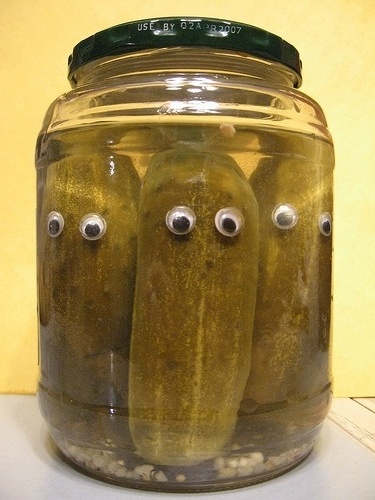Ah, the lowly pickle.
Pickling began about 4000 years ago in India using a
cucumber that is native to that country.
Designed as a way to preserve food for out-of-season use or for long
journeys, especially by sea, pickled food was not only practical, but quite
delicious. Spicy sauces made to
accompany meat dishes were called ‘pickles’ but it wasn’t until the 17th
century that brined vegetables like the cucumber or gherkin came to be called
pickles. The word pickle comes from the
Dutch or Low German pekel, meaning “something piquant”.
The process of pickling preserves food by anaerobic fermentation
in brine to produce lactic acid.
Alternately, marinating and storing food in an acid solution – usually vinegar
– creates a pickling effect as well. Antimicrobial herbs and spices, such as
mustard seed, garlic, cinnamon or cloves, are often added, which in turn add to the
flavor. In some cases the nutritional
value of the pickled food is increased by introducing B vitamins that are
produced by the bacteria.
While
pickles are a delicious addition to almost any meal, it is not considered
auspicious to find one’s self “in a pickle.”
To be in trouble or have a dilemma is considered being in a pickle, an
allusion to being as disoriented and mixed up as the stewed vegetables that
made up pickles (the sauce kind, presumably).
The phrase appears to have been coined in the 15th century,
but it wasn’t until the 19th century that the almost identical
saying, in a stew, came to be.
I can
attest, however, that being in a pickle can at times become a favorable
circumstance. This morning, for
instance, while wracking my brain for a suitable topic for today’s challenge
post, I said to myself, “Well, isn’t this a fine pickle!” It was at that point that the proverbial
light bulb flashed on in my brain and how P came to be for Pickle today.

The Husband and I have been eating pickles a lot ever since we learned that they are a good source for probiotics. I might pickle cukes this year just to see if it's worth the trouble of going homemade.
ReplyDeleteDon't be a Hippie
Take 25 to Hollister
So, those pickles ARE good for us - even when they look like trouble! Good to know!
ReplyDelete